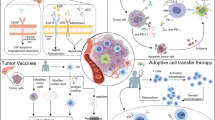Summary
Conventional therapy of pancreatic exocrine cancer is disappointing. The poor prognosis of the disease challenges development of novel therapeutic strategies. We report the results of clinical trials of the monoclonal antibody (Mab) 17-1A in patients with histologically verified unresectable pancreatic exocrine cancer. No antitumor response was seen in 18 patients treated with Mab 17-1A (500 mg) admixed with 109 autologous mono nuclear cells, and 81% of the patients developed antimouse antibody response. Combination of recombinant gamma interferon and Mab 17-1A mixed with autologous mononuclear white cells resulted in complete response of 4-mo duration in 1 out of 25 evaluable patients and unusually stable disease from 4 to 48+mo in another 6 patients. High intermittent doses of infused Mab 17-1A did not show any objective antitumor response and caused serious anaphylaxis in two of the patients in the trial. Because examination of six pancreatic adenocarcinoma cell lines with different doses of Mab 17-1A and IL-2 failed to augment lytic activity of mono nuclear effector cells against all cancer cell lines tested, there seemed to be no rationale for pursuing clinical studies with IL-2 and Mab 17-1A in either the murine or chimeric form. Attractive therapeutic approaches include active immunotherapy with immunization using idiotypic antibodies or targeted toxicity with the use of radioimmunoconjugates, particularly125I-labeled chimeric Mab 17-1A.
Similar content being viewed by others
References
Wynder EL, Mabuchi K, Maruch N, Fortner JG. Epidemiology of cancer of the pancreas. JNCI 1973; 80: 645–667.
Moertel OG, Frytak S, Hahn RG, et al. Therapy of locally unresectable pancreatic carcinoma: A randomized comparison of high dose (6000 rads) radiation alone, moderate dose radiation (400 rads + 5-Fluorouracil), and high dose radiation of + 5-Fluorouracil. The Gastrointestinal Tumor Study Group. Cancer 1981; 48: 1705–1710.
O’Connell MJ. Current status of chemotherapy for advanced pancreatic and gastric cancer. J. Clin. Oncol. 1985; 3: 1032–1039.
Koprowski H, Steplewski Z, Mitchel K, et al. Colorectal carcinoma antigens detected by hybridoma antibodies. Somat. Cell Genet. 1979; 5: 957–972.
Shen JW, Atkinson B, Koprowski H. Binding of murine immunoglobulin t human tissues after immunotherapy with anticolorectal carcinoma monoclonal antibody. Int. J. Cancer 1984; 33: 465–468.
Ernst CS, Sears HF, Herlyn M. Detection of murine immunoglobulin in human tissues following therapeutic infusion of monoclonal antibody. Hybridoma 1986; 5: S79-S86.
Steplewski Z, Lubeck MD, Koprowski H. Human macrophages armed with murine IgG2a anti-tumor immunoglobulin destroy human cancer cells. Science 1983; 221: 865–867.
Gottlinger H, Funke I, Johnson JP, et al. The epithelial cell surface antigen 17-1A, a target for antibody mediated tumor therapy: its biochemical nature, tissue distribution and recognition by different monoclonal antibodies. Int. J. Cancer 1986; 38: 47–53.
Steplewski Z, Chang TH, Herlyn M, et al. Release of monoclonal antibody-defined antigens by human colorectal carcinoma and melanoma cells. Cancer Res. 1981; 41: 2723–2727.
Sharp JG, Joshi SS, Mann SL, et al. Detection of metastasis of human colon tumor xeno grafts in nude mice using radiolabelled monoclonal antibody (Mab) fragments. Clin. Nucl. Med. 1987; 12: 32.
Herlyn D, Powe H, Alvi A, et al. Radioimmunodetection of human tumor xenografts by monoclonal antibodies. Cancer Res. 1983; 43: 2731–2735.
Moldolfsky PJ, Powe J, Mulhern CB, et al. Metastatic colon carcinoma detected with radiolabeled F (ab)2 monoclonal antibody fragments. Radiology 1983; 149: 549–555.
Chatal JF, Saccavini JC, Fumoleua P, et ah Immunoscintigraphy of colon carcinoma. J. Nucl. Med. 1984; 25: 307–314.
Adams DO, Hall T, Steplewski Z, et al. Tumors undergoing regression induced by mono clonal antibodies of the IgG2a isotype contain increased numbers of macrophages activated for a distinctive form of antibody-cytolysis. Proc. Natl. Acad. Sci. USA 1984; 81: 3506–3510.
Sears HF, Steplewski Z, Herlyn D et al. Effects of monoclonal antibody immunotherapy on patients with gastrointestinal adenocarcinoma. J. Biol. Rep. Mod. 1984; 3: 138–150.
Tempero MA, Pour PM, Uchida E, et al. Monoclonal antibody CO 17-1A and leukopheresis in immunotherapy of pancreatic cancer. Hybridoma 1986; 5: S133-S138.
Tempero MA, Sivinski CL, Steplewski Z, et al. Phase a trial of gamma interferon and monoclonal antibody 17-1A in pancreatic cancer: Biological and clinical effects. J. Clin. Oncol. 1990, in press.
Herlyn D, Sears H, Iopoulos D, et al. Anti-idiotypic antibodies to monoclonal antibody CO 17-1A. Hybridoma1986; 5: 51–58.
Wettendorff M, Ιliopoulos D, Tempero MA, et al. Idiotypic cascades in cancer patients treated with monoclonal antibody CO 17-1A. Proc. Natl Acad. Sci. USA 1989; 86: 3787–3791.
Haga Y, Sivinski C, Kay HD, et al. Biological responses to multiple high doses of murine monoclonal antibody (17-1A) in pancreatic cancer patients. Internat. J. of Pancreat. (submitted).
Frodin JE, Lefvert AK, Mellstedt H. Pharmacokinetics of the mouse monoclonal antibody 17-1A in cancer patients receiving various treatment schedules. Cancer Res. 1990; 50:4866–4871.
Woo DV, Li D, Mattis JA, Steplewski Z. Selective chromosomal damage and cytotoxicity of125Ι-labeled monoclonal antibody 17-1A in human cancer cells. Cancer Res. 1989; 49: 2952–2958.
LoBuglio AF, Wheeler RH, Trang J, et al. Mouse/human chimeric monoclonal antibody in man: Kinetics and immune response. Proc. Natl. Acad. Sci. 1989; 86: 4220–4224.
Author information
Authors and Affiliations
Rights and permissions
About this article
Cite this article
Tempero, M.A., Haga, F., Sivinski, C. et al. Immunotherapy with Monoclonal Antibody (Mab) in Pancreatic Adenocarcinoma. Int J Pancreatol 9, 125–134 (1991). https://doi.org/10.1007/BF02925588
Issue Date:
DOI: https://doi.org/10.1007/BF02925588




